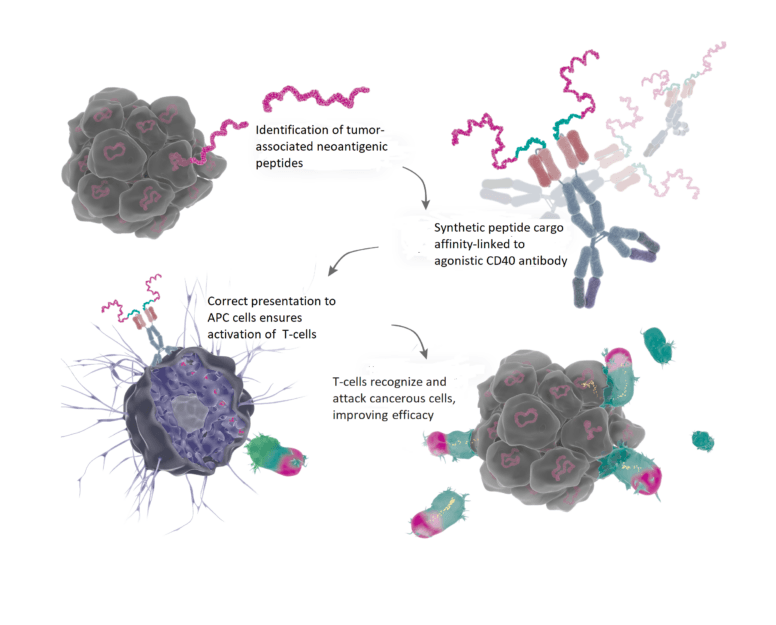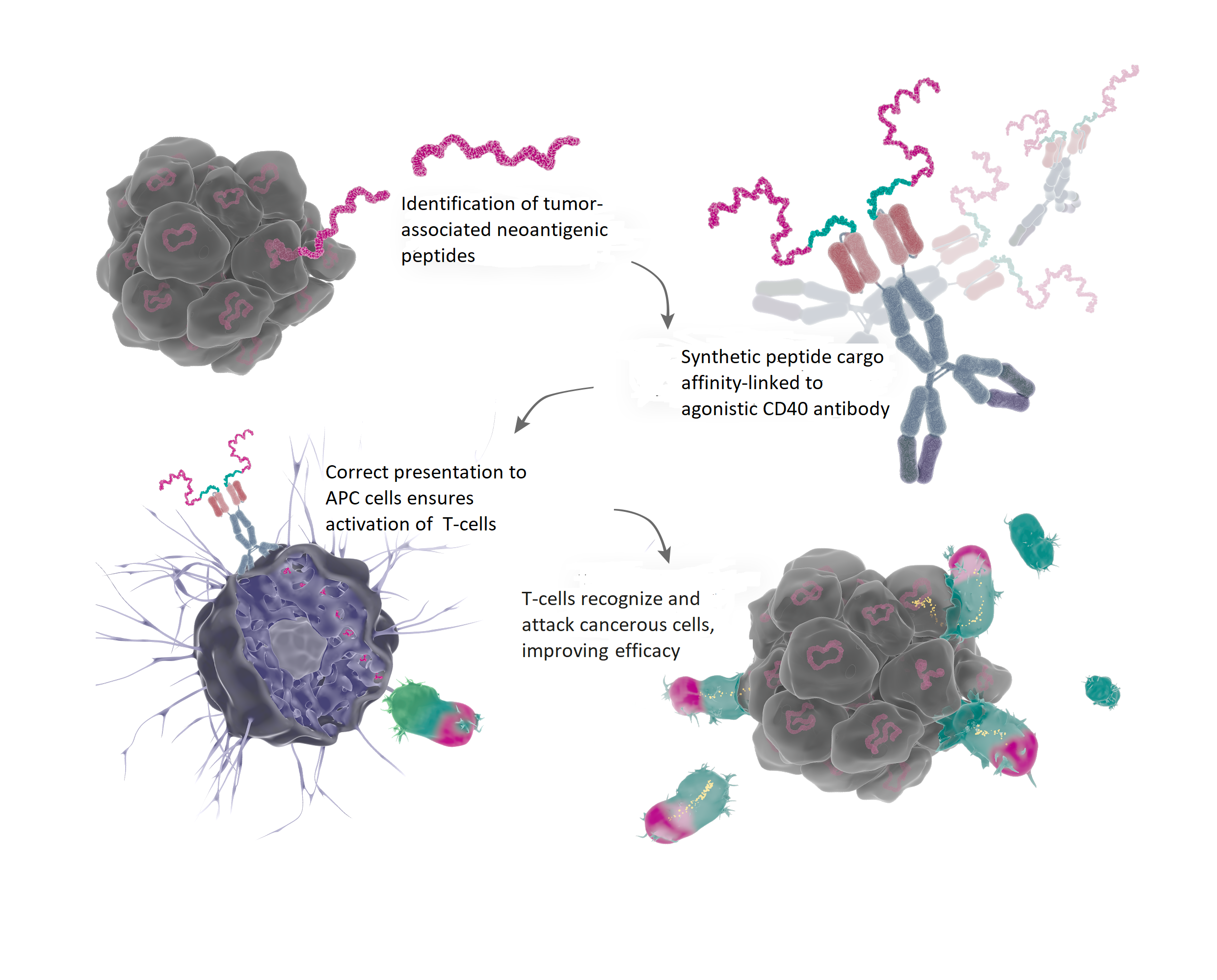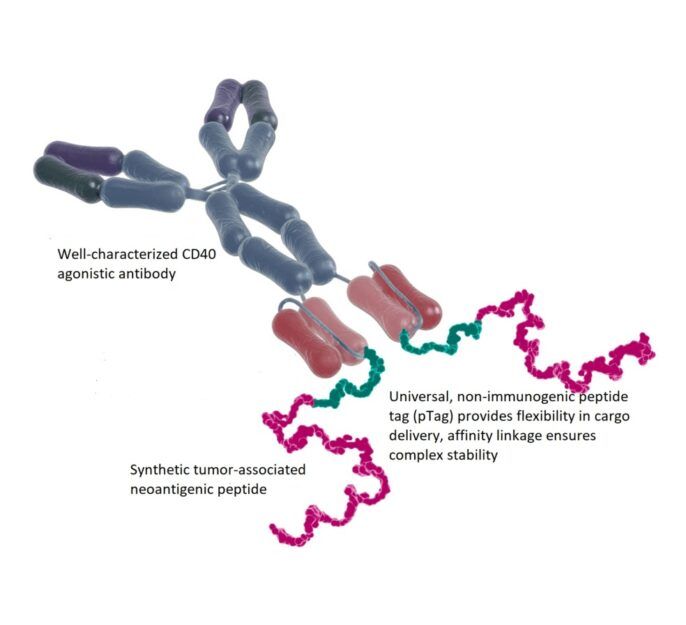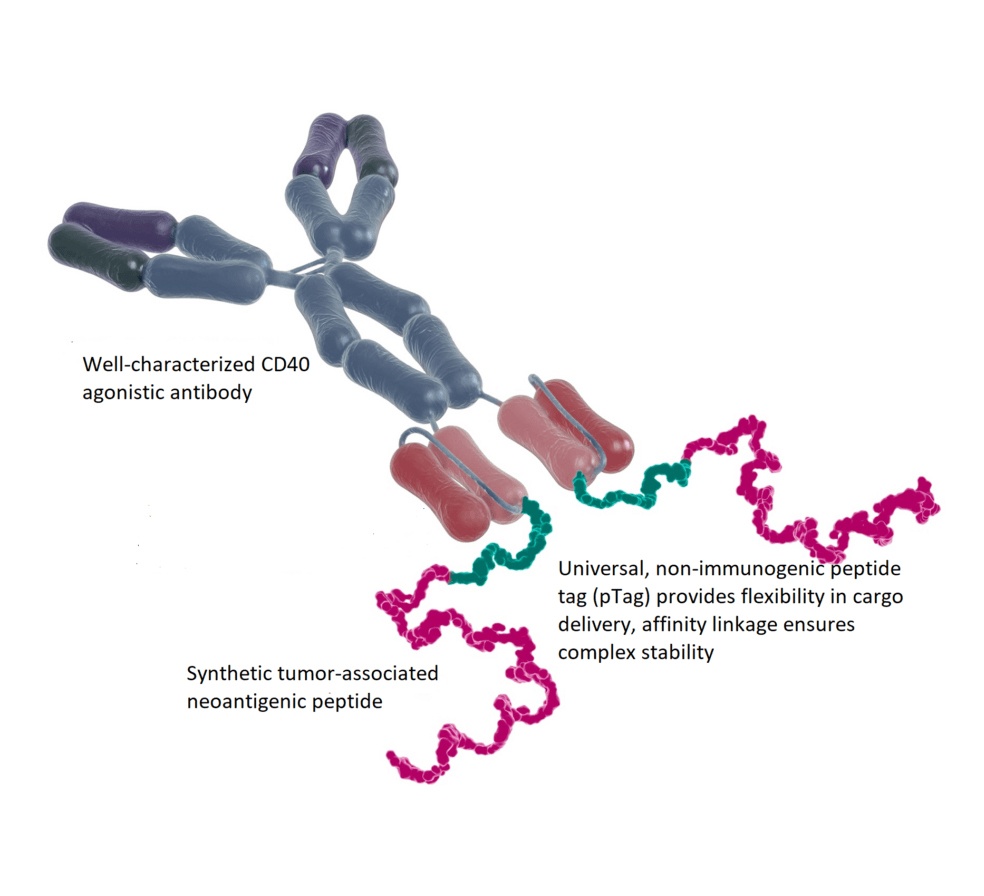Current antibody and peptide immunotherapeutics often lack sufficient efficacy while cell-based therapies, although more successful in stimulating the body’s immune system, involve cumbersome and expensive ex-vivo procedures.
Proprietary Adaptable Drug Affinity Conjugate (ADACTM) technology is being used to develop clinically-relevant, cancer immunotherapeutic candidates. Tumor-associated antigenic peptide cargoes, affinity-linked to a preselected agonistic antibody carrier, STRIKE2001, can create immunotherapeutic candidates with improved efficacy to:
- Enable the immune system to recognize and attack tumor cells
- Generate a functional ‘immune surveillance’ system to destroy metastases and provide a lasting immune response.
- Avoid the need for expensive, highly specialized ex-vivo procedures – all development is in vivo
KRAS is a well-documented and validated immunogenic target and the most common mutation found in 25% of cancers. KRAS mutations are found in melanoma, colorectal cancer, non small cell lung cancer, (NSCLC) pancreatic cancer and myeloma. Current therapies have shown poor outcomes.
- By covering multiple KRAS mutations simultaneously, STRIKE2001-KRAS can address a broad patient population across a range of indications
- STRIKE2001-KRAS can stimulate the immune system and target KRAS mutations simultaneously
- STRIKE2001 is the only molecule identified that delivers peptide directly to the immune system and targets T-cell activation (T-killer [CD8+] and T-helper cells [CD4+]) for a potent immune response
The aim is to provide treatment at an early stage in disease in order to treat and prevent reoccurrence.
Linking synthetic peptide cargoes to the STRIKE2001 carrier, a well-characterized CD40 agonistic antibody selected for its low toxicity, enables development of novel cancer immunotherapies.
- Designed to facilitate approval of future drugs, the STRIKE2001 carrier will undergo normal rigorous regulatory approval
- Pre-selected peptide antigens, synthesized with a proprietary pTag sequence, can be simply mixed with the STRIKE2001 carrier, thereby helping to minimize regulatory and CMC efforts
- Peptides can be chosen appropriately to create new chemical entities (NCEs)
It is anticipated that this approach will accelerate pipeline development, significantly reducing development and regulatory costs as well as risk.
Strike Pharma welcomes enquiries from companies interested in utilizing STRIKE2001 with their own peptide antigens.
How it works: A tumor-associated antigenic peptide ‘cargo’ is linked non-covalently via a proprietary pTag sequence to an agonistic CD40 antibody ‘carrier’. The STRIKE2001 carrier boosts the immune response to tumor antigens by activating dendritic, antigen-presenting (APC) cells which, in turn, activate T cells. Correct presentation of the antigen-antibody complex to the APC cells ensures that the APCs are recognized by T-cell lymphocytes, thereby promoting activation of anti-tumor T cells and ‘re-educating’ macrophages to destroy cancerous cells. These T cells will continue to be produced in the patient’s body thereby improving overall efficacy.
Proprietary Adaptable Drug Affinity Conjugate (ADAC) technology is used to affinity-link synthetic peptide cargoes to CD40 agonistic antibody carriers.
The design flexibility when linking carrier to cargo via an affinity-based interaction opens up many new opportunities.
- Develop highly targeted, truly individualized treatments – use any antigenic peptide based on the genetic profile of a patient’s tumor
- Enhance immunomodulation effects – correctly present the antigen-antibody complex for efficient delivery to dendritic APC cells to ensure T-cell activation
- Improve pharmacokinetic properties due to improved peptide stability – minimizing toxicity risk
- Reduce dosage requirements – highly targeted immunotherapeutic with an extended half-life
- Contribute to improving cost-effectiveness for each treatment – requires lower dosages and smaller scale production
- Transfer smoothly through clinical trials – no need to re-approve CD40 agonistic antibody carrier – change only the synthetic peptide
Why affinity?
Conventional chemical conjugation methods, used to link a ‘carrier’ antibody to its ‘cargo’ (a cytotoxic drug) for development of antibody-drug candidates (ADCs), present several challenges when trying to conjugate a biomolecule such as an antigenic peptide. Limits in design flexibility and instability of the peptide cargo are just two issues that can lead to sub-optimal efficacy. In addition, with each new peptide comes the challenge of optimizing conditions to ensure production of a stable vaccine in the most suitable formulation to facilitate in vivo delivery to dendritic cells.
How it works: Synthetic peptide cargoes, previously identified in tumors, are linked to a well-characterized CD40 agonistic antibody carriers via a universal, non-immunogenic peptide tag (pTag).
Designed to stimulate an immune response within the body to attack cancer cells and thereby strengthening the body’s natural defences, these therapeutic treatments ‘teach’ the immune system to recognize tumor-associated antigens (usually peptides or proteins) that are not found or are at very low levels in normal cells. The immune system can then react to these antigens and destroy the cancer cells.
The ADAC technology platform enables immunogenic tumor-derived peptides to be attached to agonistic CD40 antibodies so that they are delivered to antigen-presenting (APC) cells, internalized, and then presented to T cells to stimulate an anti-tumor response.
Numerous CD40 agonist antibodies with different profiles, epitope binding properties, Fc regions etc. have been evaluated in the clinic and found to be tolerable and feasible. STRIKE2001 is a CD40 agonist designed to have low toxicity.
CD40 protein is a cell-surface member of the TNF (tumor necrosis factor) receptor superfamily of cytokine receptors characterized by the ability to bind tumor necrosis factors (TNFs). Several TNF receptors are primarily involved in apoptosis (programmed cell death) and inflammation, but they can also take part in other signal transduction pathways, such as proliferation, survival, and differentiation. CD40 plays a critical role in T cell-dependent humoral immune responses. The protein is also found in other cell types such as monocytes and dendritic cells. Also widely expressed is the CD40-ligand (CD40-L/CD154), a member of the TNF family, suggesting that CD40-CD40-L interactions play a significant role in immune regulation.




